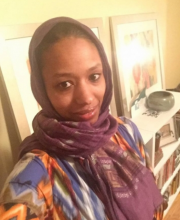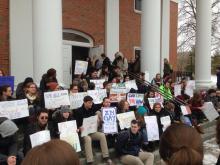wheaton

My early suspicion of Cone was reflexive. I had been formed in the intercessory prayer meetings of pious Afro-Caribbean Pentecostalism and naturalized in the halls of white evangelical academia during the so-called “post-racial” years of the Obama presidency. In those churches of my youth, racism was real, “but not nearly as bad as it had been in the past.”

What is an “evangelical” is a question now at stake on a global level. Last week at Wheaton College, a historic evangelical site, 50 fairly diverse leaders met to pray and discern together the future of evangelicalism in the U.S. When Fox News, Breitbart, and CBN (Christian Broadcasting Network) launched coordinated coverage of the meeting as “ Trump bashing,” featuring the Trump evangelical advisers to the president, you knew the meeting hit a nerve.

About 50 evangelical Christian leaders gathered early this week to discuss the future of evangelicalism amid concerns their movement has become too closely associated with President Trump’s polarizing politics.

The image of a tenured African-American political science professor at an evangelical college wearing the hijab in solidarity with Muslims caught the attention of filmmaker Linda Midgett. A Wheaton College alumna, the Louisiana-based Midgett decided the controversy that erupted from former Wheaton professor Larycia Hawkins’ Facebook photo had all the elements of a good documentary.

Larycia Hawkins, who left Wheaton College in the wake of controversy over her statement that Christians and Muslims worship one God, has a new gig: a fellowship named for a Muslim military hero.
The University of Virginia announced March 3 that she will join its Institute for Advanced Studies in Culture as the “Abd el-Kader Visiting Faculty Fellow,” named for a 19th-century Algerian leader who was committed to intercultural dialogue.
1. Trayvon Martin Was Killed Four Years Ago Today
And here’s what’s happened since. Watch. Share.
2. How a Christian College Turned Against Its Gay Leader
“While Dr. Hawkins and I were scrutinized for different reasons, our stories have this in common: we urged Christians to stand with and for groups that sit at the center of political debates. And we did that as women, one black and one gay. I can only speculate about why Wheaton’s administration has been inconsistent in their treatment of different employees, but one thing is clear: fear makes public perception supremely important.”

“Justice looks like a change in leadership,” Wyatt Harms, recent graduate and founding editor of the student online publication Wheaton Tide, wrote.
“Justice at Wheaton looks like a recognition of its discrimination and a concrete plan to address its systemic deficiencies. Justice looks like the hiring and retaining of women faculty and faculty of color. Justice looks like an independent review of this controversy free from the biased hands of the administration and the board of trustees. Justice looks like public apologies from Dr. Jones and Dr. Ryken, in which they admit their prejudices. Justice looks like this situation never happening again.”

After Provost Stanton Jones issued an apology to Dr. Larycia Hawkins, Wheaton College and Dr. Hawkins released a joint statement on February 6 announcing that they will part ways.
The statement indicated they found a mutual place of resolution and reconciliation.

Wheaton College suspended Larycia Hawkins, professor of political science, on Dec. 15 after she said Christians and Muslims "worship the same God." Hawkins' primary purpose was to announce that she would wear hijab during Advent to show her solidarity with Muslims in the United States facing persecution.
Now, according to a statement released Jan. 5, Wheaton Provost Stanton Jones delivered to President Philip Ryken a "Notice of Recommendation to Initiate Termination-for-Cause Proceedings regarding Dr. Hawkins."

Maybe, as my alma mater Wheaton College would contend, it really is about doctrinal precision. Maybe for the sake of intellectual and spiritual integrity, there is a need to parry the ontological and epistemological arguments and counter-arguments, to determine the appropriate professional future of Dr. Larycia Hawkins, who dared to say on her Facebook page on Dec. 10 that Christians and Muslims “worship the same God.” But these issues look and feel differently in a place like Jos, Nigeria — where I was born to American missionary parents, six thousand miles from Wheaton’s campus chapel.

Rejecting fearmongering about the resettlement of Syrian refugees in the U.S., about 100 evangelical leaders are calling on Christians and their churches “to support ministries showing the love of Jesus to the most vulnerable, those in desperate need, and the hurting.”
“Our statement is to change a narrative of fear and instead focus on faith and compassion,” said Ed Stetzer, executive director of LifeWay Research in Nashville, Tenn. “Our desire is not to resettle everybody in another country. When a house is burning down, we need to put out the fire and rescue people fleeing the fire.”

Dr. Larycia Hawkins, the Wheaton College professor suspended this week for public comments suggesting Muslims and Christians worship the "same god," released a statement Dec. 17 elaborating her position and her remarks to the press on Dec 16. The full text of her statement is below. The college also released a statement explaining its actions on Dec. 16, and can be read here.

Wheaton College in Illinois announced on Tuesday that they had put Hawkins on administrative leave for her “same God” comments. In an official statement, college administrators expressed concern over the “theological implications” of her statements and promising a full review.
Founded in 1860, Wheaton has long been considered a fairly open-minded institution within evangelicalism. Science professors can teach evolution, government professors need not support conservative political theories, and students don’t have to worry about strict dress codes or stringent curfews like students at more fundamentalist colleges. In 2003, it eased bans on alcohol consumption and dancing.
But a string of politically charged events, culminating in Hawkins’ suspension, place Wheaton at an important crossroads. The school must now decide what kind of evangelical college they wish to be.

Larycia Hawkins, a tenured professor at Wheaton College, pledged on Dec. 10 to wear hijab during Advent as a show of support to her Muslim neighbors.
"I don't love my Muslim neighbor because s/he is American," Hawkins wrote in a Facebook post.
"I love my Muslim neighbor because s/he deserves love by virtue of her/his human dignity."
"I stand in religious solidarity with Muslims because they, like me, a Christian, are people of the book. And as Pope Francis stated last week, we worship the same God."

I went to the mecca of evangelicalism for college — beautiful campus in the suburbs of Chicago, where I received a scholarship from none other than the Pope of Evangelicalism, Billy Graham, for my work in street evangelism. As in, speaking to random strangers on the street in order to convert them to Christianity. Post graduation, I became a missionary, the Protestant equivalent of achieving sainthood.
I look back on that girl on fire and marvel at her earnest faith. If I could, I would reach back and massage the tense knots out of her high-strung shoulders, weary from carrying the weight of her neighbors’ eternal destinies. I would wistfully explain to her that the first person she tried to witness to, that gentle, drunken, homeless woman named Kathy, needed more than my rehearsed Roman Road to salvation. Then I would break the Temporal Prime Directive and reveal to her that one day she would become more interested in being evangelized than evangelizing.
The truth is, I’m just better at being evangelized. It’s probably how I was so easily converted at the tender age of 12. The young Christian is expected to learn how to share their testimony: their story of how God changes your life. By the time I was in my twenties, I had given my testimony a bajillion times.
But my own story often bored me.

From the opening scene to its closing postscript, God’s Not Dead tells a story of persecution and courage, focusing on a young white man named Josh Wheaton (Shane Harper). “Mr. Wheaton,” as he is referred to in various parts of the movie, finds himself in a predicament on the first day of his Philosophy 150 course. In a scene that echoes Rome’s historic persecution of Christians, the powerful intellectual Professor Jeffrey Radisson (Kevin Sorbo) stands before his class of impressionable students and tells them they can skip the section of the course that discusses the existence of god, if each of them signs a piece of paper that says “god is dead.” The professor makes it clear that this proposal is more of a threat when he slowly and emphatically informs his students that the section on god’s existence is where “students have traditionally received their lowest grades of the semester.” This is Mr. Wheaton’s unexpected predicament: can he sign a piece of paper that proclaims god, as a philosophical category and concept, is dead? And if he decides not to sign that paper, can he have the courage to face the consequences?

We may not all be rich. We don’t all have successful careers. We aren’t all healthy. But the one thing we all have are stories. From the beginning of time, we have thrived on connecting via stories. We consume stories for leisure, speak our stories for sanity, and create stories to capture our imagination.
We are swayed by stories. Stories can compel others in ways propositions and facts statements cannot. Our attention wanes at statistics and exegesis, but perks at vivid characters in an engaging plot. Stories have been proven to be an effective rhetorical device. They draw people’s attention in and leaves them satisfied upon conclusion.
You cannot debate a story. While it may be tempting to try and deconstruct the reasoning behind stories when it goes against your agenda, the genius of stories is that it can’t be used as an argument. The story of a chain smoker’s longevity sits uncomfortably in the presence of someone advocating the ills of nicotine. The story just is. We cannot alter it, the only thing we can control is how we choose to respond to it. Any attempts to dishonor or discredit someone’s story is an assault to their humanity.